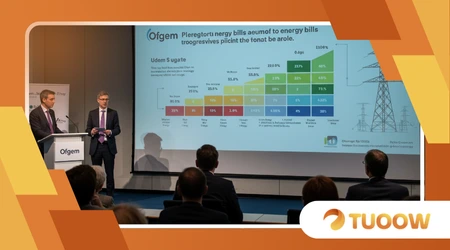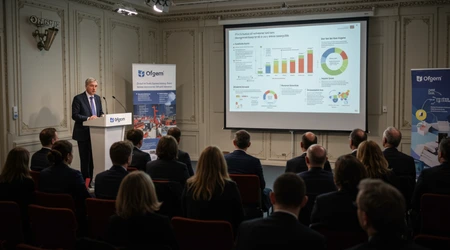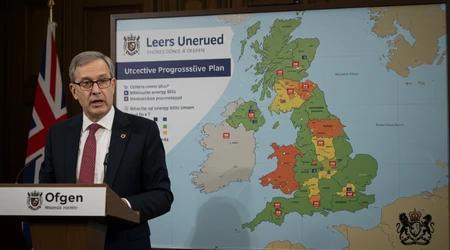Ofgem Launches Plan to Make Energy Bills Progressive—Wealthy Households Could Pay More

Ofgem launches plan to make energy bills progressive, sparking heated debate across the UK about fairness, affordability, and the path to net zero.
As energy costs soar and the nation pivots toward renewables, Ofgem’s bold review aims to reshape how we pay for power, potentially charging wealthier households more to shield lower-income families.
This move, announced in July 2025, responds to growing concerns over rising standing charges, which hit £334.07 annually nearly a fifth of the average £1,720 energy bill.
But is this progressive billing a step toward equity or a risky gamble that could deepen social divides? Let’s unpack the plan, its implications, and what it means for you.
The energy sector stands at a crossroads. With the government’s 2030 clean energy target driving £24 billion in grid upgrades, fixed costs are climbing fast.
These costs, embedded in standing charges, hit every household equally, regardless of income, raising questions about fairness.
Ofgem’s review, led by CEO Jonathan Brearley, seeks to rethink cost allocation, exploring whether wealthier households should bear a heavier burden.
This article dives into the plan’s mechanics, its potential impact, and the voices shaping the conversation, from industry leaders to everyday billpayers.
Why Progressive Billing? The Case for Change
Energy bills are no small matter they’re a daily concern for millions. Ofgem launches plan to make energy bills progressive to address a stark reality: fixed standing charges disproportionately burden low-income households.
These charges, covering grid maintenance and smart meter rollouts, don’t scale with usage, meaning a pensioner in a small flat pays the same as a high-earning family in a sprawling home.
In 2025, standing charges have ballooned from £182.27 five years ago to £334.07, squeezing those least able to pay.
The logic behind progressive billing is simple yet divisive. Wealthier households, with higher energy consumption or greater financial means, could absorb more of the fixed costs, easing the pressure on vulnerable groups.
Ofgem’s review isn’t just about fairness it’s about ensuring the transition to renewables doesn’t leave the poorest behind. As Brearley noted, “We can’t make costs disappear, but how bills are structured can have a big impact.”
Consider a single mother in Leeds, scraping by on a tight budget. Her standing charge eats up a larger share of her income than it does for a banker in London.
++ Pound Drops to Ten‑Week Low After US–EU Trade Deal Sparks Currency Volatility
Progressive billing could lower her fixed costs, freeing up cash for essentials. But the plan hinges on a tricky question: how do you measure “wealth” fairly?
The review also responds to the net zero push. Renewable energy may cut electricity unit costs, but upgrading the grid new pylons, cables, and substations drives up fixed charges.
Ofgem wants to ensure these costs don’t crush low-income households, who often can’t reduce usage further. Yet, the idea of income-based billing raises practical hurdles, like accessing household income data without invading privacy.

The Mechanics of Progressive Billing
So, how might Ofgem launches plan to make energy bills progressive actually work? The regulator is exploring ways to tie standing charges to income or proxies like council tax bands.
Wealthier households could face higher fixed charges, while low-income families might see discounts. No concrete proposals exist yet Ofgem is seeking stakeholder input until early 2026 but the idea is to rebalance costs without scrapping standing charges entirely.
One potential model is a tiered standing charge system. For example, households in higher council tax bands (E-H) could pay £400 annually, while those in lower bands (A-D) might pay £200.
Also read: UK-France Sign ‘Northwood Declaration’: First Ever Nuclear Cooperation Pact
This approach, suggested by industry voices like Ecotricity’s Dale Vince, could include a tax-free allowance of, say, 2,000 kWh of electricity yearly, exempting low-usage households from levies. Such a system incentivizes efficiency while protecting the vulnerable.
| Household Type | Current Standing Charge (£/year) | Proposed Progressive Charge (£/year) |
|---|---|---|
| Low-income (Band A-D) | 334.07 | 200 |
| Middle-income (Band E-F) | 334.07 | 300 |
| High-income (Band G-H) | 334.07 | 400 |
Table: Hypothetical progressive standing charge model based on council tax bands, illustrating potential cost shifts (Source: Inspired by Ofgem’s Cost Allocation Review, 2025).
Another approach could involve dynamic pricing, where fixed charges vary by region or usage patterns. For instance, households using renewable-heavy grids might pay less to encourage green energy adoption.
But these models face logistical challenges energy suppliers don’t have access to income data, and council tax bands are an imperfect wealth indicator.
The review also considers scrapping standing charges altogether, folding costs into unit rates. However, Ofgem warns this could backfire, raising costs for high-usage, low-income households, like those with electric heating.
Read more: High Court Rules on Major Immigration Policy Challenge
Roughly 1.2 million low-income households rely on electric heating, making them vulnerable to such a shift. The regulator’s cautious approach reflects the complexity of balancing fairness with practicality.
The Risks: Winners, Losers, and Unintended Consequences
Progressive billing sounds noble, but it’s not without pitfalls. Ofgem launches plan to make energy bills progressive to protect the vulnerable, yet critics warn it could alienate the middle class.
Claire Coutinho, shadow energy secretary, argues Ofgem should focus on cutting bills for all, not “shuffling costs around.”
Wealthier households might feel unfairly targeted, especially as net zero levies are projected to rise 60% by 2030, per the Office for Budget Responsibility.
Imagine a small business owner in Manchester, earning just enough to fall into a “high-income” bracket. Higher standing charges could stretch their budget, despite their modest lifestyle.
This raises a rhetorical question: is it fair to penalize aspiration to protect the vulnerable, or does fairness demand shared sacrifice? The risk of resentment is real, especially if the system feels opaque or punitive.
Data privacy is another hurdle. Linking bills to income requires sensitive information, which suppliers don’t currently hold.
Using proxies like council tax bands could oversimplify wealth, misclassifying households. A retiree in a high-value home might struggle with higher charges despite a fixed pension. Ofgem must tread carefully to avoid missteps that erode public trust.
Then there’s the risk of disincentivizing energy efficiency. If low-income households pay less regardless of usage, some might consume more, undermining net zero goals.
Conversely, wealthier households facing higher charges might cut usage drastically, skewing demand forecasts. Ofgem’s challenge is crafting a system that’s fair, transparent, and sustainable.
Voices from the Ground: Industry and Public Reactions

The public’s response to Ofgem launches plan to make energy bills progressive is a mixed bag, reflecting the UK’s polarized views on fairness and net zero.
X posts reveal strong sentiments: @paullewismoney highlighted the means-testing debate, while @NetZeroWatch warned of endlessly rising bills under net zero policies. These voices underscore the tension between affordability and environmental ambition.
Industry leaders are equally divided. Dale Vince of Ecotricity backs progressive billing, citing his proposal for a tax-free energy allowance. He argues it rewards efficiency and protects the poor.
Conversely, Eon UK’s Chris Norbury cautions against “short-term solutions” that shift costs without addressing root issues.
He advocates eliminating standing charges entirely, though Ofgem warns this could raise unit rates, hitting high-usage households hard.
Consumer groups like Citizens Advice stress the need for transparency. Martin Lewis, a vocal critic of standing charges, calls them a “moral hazard” for burdening the poor.
His 2025 campaign pushed for low-usage tariffs, which Ofgem’s review might weaken a move that sparked his public concern. These voices highlight the stakes: a misstep could deepen distrust in the energy system.
Grassroots reactions add urgency. In 2022, protests outside Ofgem’s London HQ demanded action against “astronomical” bills, with groups like Don’t Pay UK calling for payment strikes.
While bills have since stabilized at £1,720 annually, the memory of £3,549 price caps lingers, fueling skepticism about Ofgem’s ability to deliver fairness.
A Broader Vision: Net Zero and Social Equity
Beyond billing, Ofgem launches plan to make energy bills progressive ties into the UK’s net zero journey.
The £24 billion grid investment approved in July 2025 Britain’s biggest since the 1960s aims to bolster energy security and renewables.
But who pays for it? The current system spreads costs evenly, but progressive billing could align with broader social equity goals, ensuring the green transition doesn’t widen inequality.
Think of the energy system like a communal kitchen: everyone chips in for the stove, but some can barely afford the meal. Progressive billing aims to adjust contributions based on means, ensuring all can eat.
Yet, the kitchen still needs upgrading, and someone must foot the bill. Ofgem’s review asks whether wealthier diners should pay more for the stove’s upkeep, a question that’s both practical and philosophical.
The review also explores regional pricing variations. Should households in renewable-rich areas like Scotland pay less? This could incentivize green energy but risks regional disparities.
Ofgem’s collaboration with the government and National Energy System Operator (NESO) aims to align these ideas with national policy, but ministerial decisions on funding via bills or taxes will shape the outcome.
Public trust hinges on execution. The 2022 energy crisis, when 30 suppliers collapsed, cost billpayers £2.7 billion, or £94 per household.
Ofgem’s push for a “resilient” market through progressive billing must avoid repeating such failures. Transparency, stakeholder input, and clear communication will be key to winning over a skeptical public.
The Road Ahead: Challenges and Opportunities
As Ofgem launches plan to make energy bills progressive, the path forward is fraught with challenges but rich with potential. The review’s success depends on balancing fairness with feasibility.
Income-based billing could transform energy affordability, but only if suppliers can access reliable data without overstepping privacy boundaries.
Council tax bands offer a workaround, but their flaws outdated valuations, regional inconsistencies demand refinement.
Stakeholder engagement will shape the outcome. Ofgem’s call for input, open until January 2026, invites charities, suppliers, and consumers to weigh in.
This collaborative approach could foster innovative solutions, like tiered discounts for low-income households or incentives for energy-efficient appliances. But it must avoid capture by powerful industry players who might prioritize profits over fairness.
The opportunity lies in redefining energy as a public good. Progressive billing could set a precedent for equitable cost-sharing in other sectors, like water or broadband.
By aligning with net zero goals, it could also encourage sustainable consumption, rewarding households that invest in insulation or solar panels. Yet, without clear communication, the plan risks being seen as another top-down imposition.
Politically, the review is a tightrope walk. Labour’s net zero ambitions, led by Ed Miliband, rely on public support, but higher bills for wealthier households could spark backlash.
Ofgem must navigate this while ensuring vulnerable consumers aren’t left behind. The stakes are high: a 2023 Ofgem report found 1.2 million low-income households rely on electric heating, making them sensitive to billing changes.
Conclusion: A Fairer Future or a Divisive Experiment?
Ofgem’s bold move to rethink energy billing reflects a deeper question: how do we build a fair, sustainable energy system?
Ofgem launches plan to make energy bills progressive offers a chance to protect the vulnerable while advancing net zero, but it’s not a cure-all. Rising grid costs, privacy concerns, and public skepticism pose real challenges.
Yet, the potential to ease the burden on low-income households and align billing with social equity is worth exploring.
This isn’t just about bills it’s about trust. Ofgem must engage consumers, avoid opaque processes, and deliver a system that feels just.
Whether it’s a single mother in Leeds or a business owner in Manchester, every household deserves clarity and fairness.
As the review unfolds, one thing is certain: the way we pay for energy will shape the UK’s future, for better or worse. Will you be ready for the change?
Frequently Asked Questions
1. What is Ofgem’s progressive billing plan?
It’s a review to make energy bills fairer, potentially charging wealthier households higher standing charges to reduce costs for low-income families.
2. How would wealth be measured for billing?
Ofgem is exploring proxies like council tax bands or income data, though accessing financial details raises privacy concerns.
3. Will my energy bill increase?
It depends on your income or household type. Wealthier households might pay more; low-income ones could see discounts.
4. When will changes take effect?
No timeline is set. Ofgem is gathering input until January 2026, with proposals to follow.
5. Can I provide feedback on the plan?
Yes, Ofgem welcomes input from consumers, charities, and businesses via their website until early 2026.
